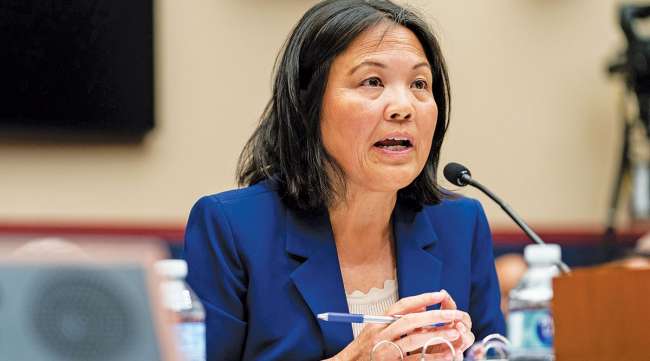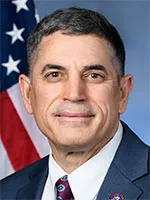Senior Reporter
Capitol Hill Republicans Press Acting Labor Secretary Su

[Stay on top of transportation news: Get TTNews in your inbox.]
During a U.S. House subcommittee hearing with acting Labor Secretary Julie Su on April 17, a Republican lawmaker on the panel raised concerns about a federal employee classification rule.
Rep. Andrew Clyde (R-Ga.) pressed the acting secretary about the Biden administration’s rule that reclassifies certain independent contractors as company employees. A member of the Labor, Health and Human Services, Education Appropriations Subcommittee, Clyde was echoing a viewpoint from dozens of congressional Republicans who are actively pursuing to pause the rule. The subcommittee is tasked with allocating funds for the Department of Labor.
“Whether it is a full-time profession, a second job or part-time work, roughly 45% of the American workforce are pursuing employment as independent contractors to keep food on their tables and provide for their families,” Clyde told Su during the hearing.
“These workers choose an independent contractor status because of the flexibility and the autonomy it provides, allowing them to determine when and with whom they do business,” the congressman continued. “Those contracts between businesses and independent contractors are agreed to by both parties, and it is far beyond the Department of Labor’s reach or authority to intervene in these private business dealings. By making it harder for individuals to qualify as independent contractors, the Department of Labor is placing additional liability on business, resulting in fewer contract opportunities for independent workers and a slower, more tedious hiring process.”

Clyde
Responding to Clyde’s concerns, Su argued the rule aims to promote fairness and certain benefits in the workplace. As she put it, “Our goal, really congressman, was to make sure that somebody who should be an employee ... should enjoy all the protections of a century’s worth of labor law protections, like minimum wage, like the right to overtime.”
The new Labor Department rule, announced at the start of the year, outlines factors for companies to evaluate and ultimately determine whether an employee’s classification meets the standard of an independent contractor. The rule is modeled after California AB 5, a law informed partly by Su during her tenure in the Golden State.
A cadre of congressional Republicans recently introduced a joint resolution of disapproval specific to the rule. Last month, the House Labor and the Workforce Committee approved the resolution designed to nullify the administration’s independent contractor rule. Committee Chairwoman Virginia Foxx (R-N.C.) said March 21 that the panel’s action affirms the “rights of independent contractors whose livelihoods will be decimated by President [Joe] Biden’s new rule to reclassify them.”
The freedom of choice.
The flexibility to decide one's own schedule.
The dream of running your own business.
These are the stakes as the U.S. Department of Labor implements a new independent contractor classification rule. #trucking #ProtectICs pic.twitter.com/KAiTspDA9H — American Trucking (@TRUCKINGdotORG) March 20, 2024
Stakeholders, such as American Trucking Associations, are actively pushing back on the independent contractor rule. “More than 350,000 truckers choose to work as independent contractors because of the economic opportunity it creates and the flexibility it provides, enabling them to run their own business and choose their own hours and routes,” ATA President Chris Spear said in January. “That freedom of choice has been an enormous source of empowerment for women, minorities and immigrants pursuing the American Dream. It’s unfortunate that the administration has chosen to replace a clear and straightforward standard with a tangled mess that weakens our supply chain and undermines the livelihoods of hundreds of thousands of truckers across the country.”

Spear
At the House appropriations hearing, Su also pressed lawmakers to support the White House’s $13.9 billion request for the department’s budget in fiscal 2025. The acting secretary told the panel that the request “continues to build on the Biden-Harris administration’s principles for growing a worker-centered economy from the bottom up and the middle out by creating pathways to good jobs and expanding equitable opportunities while empowering and protecting workers and their families.”
Earlier this year, the Senate Health, Education, Labor and Pensions Committee advanced along party lines Su’s nomination to serve as secretary. A floor vote on her nomination has yet to be scheduled by Senate Democrats governing in the majority.
Want more news? Listen to today's daily briefing below or go here for more info:




